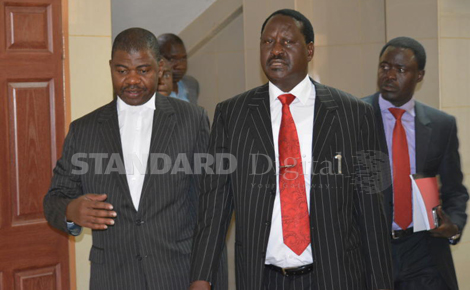×
The Standard e-Paper
Kenya’s Boldest Voice
 |
| From left: Lawyer TJ Kajwang’ (left), CORD leader Raila Odinga and Homa Bay Town MP Peter Kaluma leave the Milimani law court Wednesday after the hearing of a case over the controversial Security Amendment laws 2014. [Photo: courtesy] |
NAIROBI: The rivalry between the Jubilee and CORD coalitions played out in court Wednesday when former premier Raila Odinga attended the hearing of a case the Opposition has filed challenging the legality of the controversial Security Laws (Amendment) Act 2014.
Raila was present throughout Wednesday’s hearing as CORD lawyer and Siaya Senator James Orengo tore into the laws passed by the Jubilee dominated National Assembly in acrimonious circumstances last month.